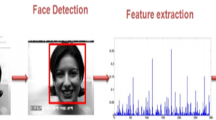Abstract
Facial expression inevitably leads to facial deformation. In this paper, the advantages and disadvantages of feature extraction and recognition method are considered. A facial expression recognition method based on mixed feature fusion of nine types of personality is proposed. The texture features are extracted by discrete wavelet transform and standard orthogonal non negative matrix decomposition for a person’s facial expression image sequence, and AAM square is used. The method calculates the coordinate difference between the expression key points of the expression frame and the neutral frame in the image sequence, and extracts the geometric deformation characteristics. Then use the canonical correlation analysis (CCA) to fuse the two features, and finally use discrete HMM to classify faces.
Access this chapter
Tax calculation will be finalised at checkout
Purchases are for personal use only
Similar content being viewed by others
References
Jia, X., Wen, C.C., Bao, X.Y.: Expression recognition based on dynamic image sequence. J. Beijing Univ. Technol. 9, 1360–1365 (2013)
Wang, L., Liu, J., Fu, X.: Facial expression recognition integrating local features and depth belief network. Laser Optoelectron. Prog. 1, 198–206 (2018)
Zhao, J., Mao, X., Zhang, J.: Learning deep facial expression features from image and optical flow sequences using 3D CNN. Visual Comput. 34, 1–15 (2018)
Li, H., Roivainen, P., Forcheimer, R.: 3-D motion estimation in model-based facial image coding. IEEE Trans. Pattern Anal. Mach. Intell. 15(6), 545–555 (1993)
Seal, A., Bhattacharjee, D., Nasipuri, M., Gonzalo-Martin, C., Menasalvas, E.: Histogram of bunched intensity values based thermal face recognition. In: Kryszkiewicz, M., Cornelis, C., Ciucci, D., Medina-Moreno, J., Motoda, H., Raś, Z.W. (eds.) RSEISP 2014. LNCS (LNAI), vol. 8537, pp. 367–374. Springer, Cham (2014). https://doi.org/10.1007/978-3-319-08729-0_38
Zhang, Y., Prakash, E.C., Sung, E.: Efficient modeling of an anatomy-based face and fast 3D facial expression synthesis. Comput. Graph. Forum 22(2), 159–169 (2010)
Acknowledgments
This work was supported by The Education Department of Jilin Province. I would like to thank those who took care of me, encouraged me and helped me when I am finishing this paper.
Author information
Authors and Affiliations
Corresponding author
Editor information
Editors and Affiliations
Rights and permissions
Copyright information
© 2019 Springer-Verlag GmbH Germany, part of Springer Nature
About this chapter
Cite this chapter
Luo, Jl., Zhu, Ml., Wang, Qq. (2019). Typing Technology of Virtual Character of Animation Based on Enneagram Personality. In: Pan, Z., Cheok, A., Müller, W., Zhang, M., El Rhalibi, A., Kifayat, K. (eds) Transactions on Edutainment XV. Lecture Notes in Computer Science(), vol 11345. Springer, Berlin, Heidelberg. https://doi.org/10.1007/978-3-662-59351-6_6
Download citation
DOI: https://doi.org/10.1007/978-3-662-59351-6_6
Published:
Publisher Name: Springer, Berlin, Heidelberg
Print ISBN: 978-3-662-59350-9
Online ISBN: 978-3-662-59351-6
eBook Packages: Computer ScienceComputer Science (R0)




